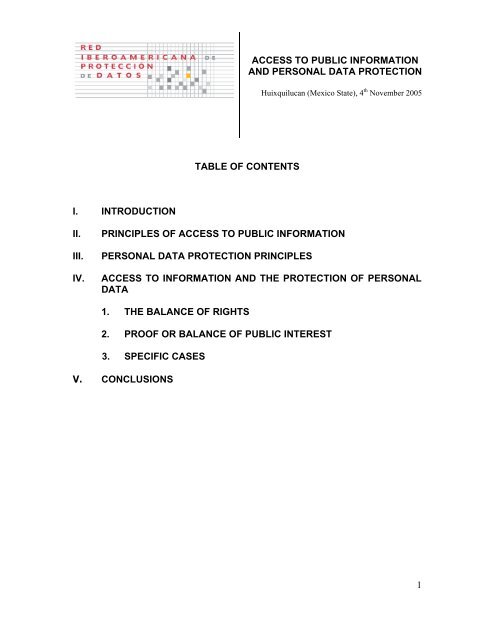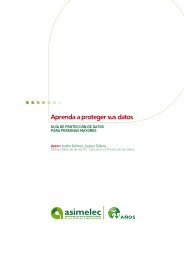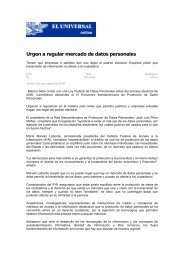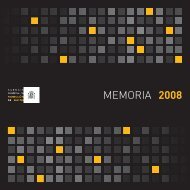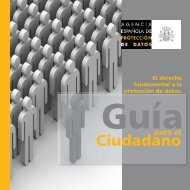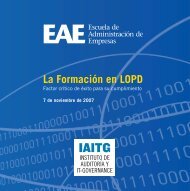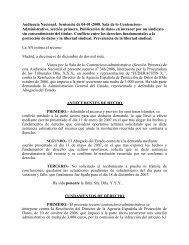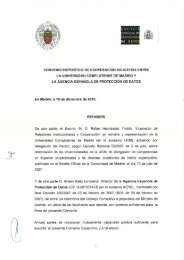access to public information and personal data protection 1 table of ...
access to public information and personal data protection 1 table of ...
access to public information and personal data protection 1 table of ...
Create successful ePaper yourself
Turn your PDF publications into a flip-book with our unique Google optimized e-Paper software.
ACCESS TO PUBLIC INFORMATIONAND PERSONAL DATA PROTECTIONHuixquilucan (Mexico State), 4 th November 2005TABLE OF CONTENTSI. INTRODUCTIONII.III.IV.PRINCIPLES OF ACCESS TO PUBLIC INFORMATIONPERSONAL DATA PROTECTION PRINCIPLESACCESS TO INFORMATION AND THE PROTECTION OF PERSONALDATA1. THE BALANCE OF RIGHTS2. PROOF OR BALANCE OF PUBLIC INTEREST3. SPECIFIC CASESV. CONCLUSIONS1
ACCESS TO PUBLIC INFORMATIONAND PERSONAL DATA PROTECTIONHuixquilucan (Mexico State), 4 th November 2005I. INTRODUCTIONThe right <strong>to</strong> <strong>access</strong> <strong>public</strong> <strong>information</strong>, that is, <strong>information</strong> in the possession <strong>of</strong><strong>public</strong> sec<strong>to</strong>r entities in modern societies, constitutes a control mechanism thatenables citizens <strong>to</strong> be aware <strong>of</strong> the actions taken by this sec<strong>to</strong>r <strong>and</strong> acts as avehicle through which the sec<strong>to</strong>r can account for such actions. In this respect,<strong>access</strong> <strong>to</strong> <strong>public</strong> <strong>information</strong> has become a fundamental component <strong>of</strong> ademocratic, transparent society.However, the necessary transparency that must prevail in government activitiesmust also be reconciled with the legal interests protected by law, such as otherfundamental human rights, particularly the fundamental right <strong>to</strong> privacy. Thisreconciliation becomes even more evident if we take in<strong>to</strong> account the effects <strong>of</strong>the fast progress <strong>of</strong> technology on the issue <strong>of</strong> privacy.As the case in point encompasses two rights, certain conflicts may underlieparticular cases <strong>of</strong> <strong>access</strong> <strong>to</strong> <strong>information</strong> <strong>and</strong> the <strong>protection</strong> <strong>of</strong> <strong>personal</strong> <strong>data</strong>,arising from the fact that both rights cannot be exercised absolutely in all cases.The rights <strong>of</strong> all those affected must be respected, <strong>and</strong> no single right mustprevail over others, except in clear <strong>and</strong> express circumstances. The lawsgoverning <strong>access</strong> <strong>to</strong> <strong>information</strong> set out a clear, well-defined list <strong>of</strong> the mattersthat cannot be made <strong>public</strong>. Generally, there are two types <strong>of</strong> <strong>data</strong> envisaged asexceptions <strong>to</strong> <strong>access</strong>; the first usually refers <strong>to</strong> those matters limited only <strong>to</strong> theState in <strong>protection</strong> <strong>of</strong> the general <strong>public</strong> good, such as national security, damage<strong>to</strong> the national economy or international relations. In cases where governmental<strong>information</strong> is reserved, the relevant authorities must prove the damage thatdiffusion <strong>of</strong> certain <strong>information</strong> will effectively cause <strong>to</strong> the legal interestsprotected by law, so that the least amount <strong>of</strong> <strong>information</strong> possible is reserved <strong>to</strong>benefit the individual, thus facilitating assessment <strong>of</strong> governmental activities.The other type <strong>of</strong> <strong>information</strong> held by the State is related <strong>to</strong> the <strong>personal</strong> <strong>data</strong> <strong>of</strong>both private citizens <strong>and</strong> legal entities. In the case <strong>of</strong> individuals, their <strong>personal</strong><strong>data</strong> are protected by the laws <strong>of</strong> <strong>access</strong> <strong>to</strong> confidential <strong>data</strong> <strong>and</strong> by <strong>personal</strong><strong>data</strong> <strong>protection</strong> legislation.2
ACCESS TO PUBLIC INFORMATIONAND PERSONAL DATA PROTECTIONHuixquilucan (Mexico State), 4 th November 2005Likewise, the exercise <strong>of</strong> the right <strong>to</strong> <strong>personal</strong> <strong>data</strong> <strong>protection</strong> has its limits,although such limits must meet the following criteria: a) they are permissible <strong>to</strong>the extent that there is a prevailing <strong>public</strong> interest; b) there is an express,precise, legal instrument that meets the requirements <strong>of</strong> the principle <strong>of</strong>proportionality; c) the doubt in question should be interpreted in a limited manner,as it is a matter <strong>of</strong> “guaranteeing <strong>and</strong> protecting <strong>public</strong> freedoms <strong>and</strong> thefundamental rights <strong>of</strong> individuals with respect <strong>to</strong> <strong>personal</strong> <strong>data</strong> processing, <strong>and</strong> inparticular, their honour <strong>and</strong> <strong>personal</strong> <strong>and</strong> family privacy”, <strong>and</strong> d) theconsideration <strong>of</strong> whether such limits not only violate the principles <strong>of</strong> consent <strong>and</strong>purpose established by <strong>personal</strong> <strong>data</strong> <strong>protection</strong> laws, but also the principle <strong>of</strong>quality, which provides that only the <strong>data</strong> that is absolutely necessary should bemade available <strong>to</strong> attain the aforesaid purpose.It may be said that there is no true a priori conflict between the right <strong>to</strong><strong>information</strong> <strong>and</strong> the right <strong>to</strong> <strong>personal</strong> <strong>data</strong> <strong>protection</strong>, <strong>and</strong> therefore, no priorlegal-philosophical scenario need occupy our attention. It is rather a question <strong>of</strong>seeing that the relevant authorities, or those with jurisdictional or quasijurisdictionalpowers, resolve the issues amicably as they arise, ad casum.Furthermore, democratic societies must safeguard the <strong>protection</strong> <strong>of</strong> <strong>personal</strong><strong>data</strong>. The most fully developed regime for such <strong>protection</strong> is envisaged in theEuropean models, which are based primarily on Convention 108 <strong>of</strong> the EuropeanCouncil on the <strong>protection</strong> <strong>of</strong> individuals with regards <strong>to</strong> processing <strong>of</strong> <strong>personal</strong><strong>data</strong> issued in 1981, <strong>and</strong> Directive 95/46/EC <strong>of</strong> the European Parliament <strong>and</strong>Council on the Protection <strong>of</strong> Personal Data.The aforementioned legislation also establishes the rights <strong>to</strong> <strong>access</strong>, correction,cancellation <strong>and</strong> opposition as fundamental rights <strong>of</strong> all <strong>data</strong> subjects.Thus, the present study is addressed at setting out the principles that govern<strong>access</strong> <strong>to</strong> <strong>public</strong> <strong>information</strong> on the one h<strong>and</strong>, <strong>and</strong> those regulating <strong>personal</strong> <strong>data</strong><strong>protection</strong> on the other; the possible exceptions <strong>to</strong> those principles, <strong>and</strong> certaincases <strong>of</strong> conflicts <strong>of</strong> rights that may arise due <strong>to</strong> the diversity <strong>of</strong> the principles thatapply <strong>to</strong> both issues.3
ACCESS TO PUBLIC INFORMATIONAND PERSONAL DATA PROTECTIONHuixquilucan (Mexico State), 4 th November 2005II. PRINCIPLES OF ACCESS TO PUBLIC INFORMATIONThe regulation <strong>of</strong> <strong>access</strong> <strong>to</strong> <strong>public</strong> <strong>information</strong> is a relatively recent phenomenon.Three-quarters <strong>of</strong> the sixty countries that currently have legislation governing<strong>access</strong> <strong>to</strong> <strong>information</strong> approved these laws in the last 15 years. The aforesaidregulations vary in their structure; for example, some countries have laws thatgovern <strong>access</strong> <strong>to</strong> <strong>information</strong> at federal, state or provincial levels, with differingdegrees <strong>of</strong> scope <strong>and</strong> content.Access <strong>to</strong> the <strong>public</strong> <strong>information</strong> held by the government is an important conceptfor various reasons. Firstly, the true owner <strong>of</strong> the <strong>information</strong> is actually theindividual. It is the people who elect a government <strong>and</strong> entrust it with the power<strong>to</strong> take decisions on <strong>public</strong> matters. The government collects <strong>information</strong> <strong>and</strong>takes decisions that are subsequently recorded in different documents. But, all <strong>of</strong>this is done on behalf <strong>of</strong> the people, as the people’s representative. Therefore,the people are entitled <strong>to</strong> know <strong>and</strong> <strong>access</strong> all the <strong>information</strong> that thegovernment has generated. Secondly, <strong>access</strong> <strong>to</strong> <strong>information</strong> is one <strong>of</strong> thefoundations on which accountability is based, <strong>and</strong> accountability is an essentialcomponent <strong>of</strong> effective democracy. Accountability means that <strong>public</strong> servantsare required <strong>to</strong> inform the <strong>public</strong> about government actions. Many regulations on<strong>access</strong> <strong>to</strong> <strong>information</strong> oblige governmental agencies <strong>to</strong> publish various types <strong>of</strong><strong>information</strong>, which are actually another instrument for accountability. And thirdly,<strong>access</strong> <strong>to</strong> <strong>information</strong> is an effective mechanism for evaluating <strong>and</strong> controllingthose in power. This type <strong>of</strong> legislation entitles individuals <strong>and</strong> organisations <strong>to</strong>request <strong>information</strong> that enables them <strong>to</strong> study the actions <strong>of</strong> their leaders indifferent matters. Public servants are aware that they are accoun<strong>table</strong> for theiractions, <strong>and</strong> this creates an incentive for them <strong>to</strong> act in accordance with theirm<strong>and</strong>ate <strong>and</strong> the legislation applicable <strong>to</strong> their sphere <strong>of</strong> responsibility.Given the foregoing, legislation regulating <strong>access</strong> <strong>to</strong> <strong>public</strong> <strong>information</strong> must beviewed as a priority in all governments, particularly when endeavouring <strong>to</strong> openup a new relationship with society. Certain general principles must be taken in<strong>to</strong>account in order <strong>to</strong> effectively legislate in this respect. 1 Firstly, the principle <strong>of</strong>maximum <strong>public</strong> <strong>access</strong> must be a priority. Many national regulations envisagethis principle, which stipulates that all the <strong>information</strong> in the possession <strong>of</strong> the1 For a more in-depth discussion <strong>of</strong> the principles <strong>of</strong> the right <strong>of</strong> <strong>access</strong> <strong>to</strong> <strong>information</strong>, see Mendel,Toby. Freedom <strong>of</strong> Information: A Comparative Legal Survey. New Delhi: UNESCO, 2003.4
ACCESS TO PUBLIC INFORMATIONAND PERSONAL DATA PROTECTIONHuixquilucan (Mexico State), 4 th November 2005laws do not provide mechanisms <strong>to</strong> reinforce <strong>access</strong> <strong>to</strong> <strong>information</strong>, while inothers, the government creates obstacles or takes advantage <strong>of</strong> legal vacuums<strong>to</strong> avoid having <strong>to</strong> make the <strong>information</strong> in its possession <strong>public</strong>.The fifth relevant principle refers <strong>to</strong> the provision <strong>of</strong> <strong>information</strong> free <strong>of</strong> cost, orthe establishment <strong>of</strong> costs that make requests for <strong>information</strong> affordable by all. Ingeneral, this implies that the government body must keep the cost <strong>of</strong> reproducingthe <strong>information</strong> <strong>to</strong> a minimum, even when such cost may be passed on <strong>to</strong> theparty requesting it. Many other fac<strong>to</strong>rs must also be included in laws governing<strong>access</strong> <strong>to</strong> <strong>public</strong> <strong>information</strong>. Penalties for non-compliance, for example, is onesuch fac<strong>to</strong>r, although the existing legislation varies considerably in this respect.A sixth principle has <strong>to</strong> do with finding the institutional structure that envisagesthe persons responsible for h<strong>and</strong>ling requests for <strong>access</strong> within the governmentbody <strong>and</strong> mechanisms for revising the decisions taken by such persons. Thesemechanisms may be implemented either in the government agency itself orthrough a body entrusted with overseeing observance <strong>of</strong> the law. The latter isone <strong>of</strong> the most solid principles on which effective <strong>access</strong> <strong>to</strong> <strong>public</strong> <strong>information</strong> inthe possession <strong>of</strong> the State is based.Furthermore, a key issue <strong>to</strong> be considered <strong>and</strong> for which there is no preestablishedprinciple is the scope <strong>of</strong> application <strong>of</strong> the law. The majority <strong>of</strong>legislation on this matter stipulates that federal or national government agenciesare subjects with obligations under the law, including those operating indecentralised regimes. Other countries establish a general law that governs thisright over practically all the <strong>public</strong> bodies <strong>of</strong> the State, both at national <strong>and</strong> locallevels. On the other h<strong>and</strong>, countries with unitary governments will probably se<strong>to</strong>ut generally or nationally applicable laws that govern <strong>access</strong> <strong>to</strong> <strong>information</strong> inpractically every government body. The essential point here is that citizens havea government that is open in matters <strong>of</strong> <strong>access</strong> <strong>to</strong> <strong>information</strong>. That is, regardless<strong>of</strong> the type <strong>of</strong> government <strong>of</strong> the country in question, citizens have the legalmechanisms <strong>to</strong> enable them <strong>access</strong> <strong>to</strong> the <strong>public</strong> <strong>information</strong> held by theirgovernment, whether this is national, federal or local. Perhaps a federal stateshould have more than one law on <strong>access</strong> <strong>to</strong> <strong>information</strong> <strong>to</strong> be able <strong>to</strong> ensure<strong>access</strong> <strong>to</strong> all government documents. But is must be stressed that <strong>access</strong> <strong>to</strong><strong>information</strong> is a fundamental right that guarantees the true exercise <strong>of</strong>democracy, <strong>and</strong> the type <strong>of</strong> government should not be an obstacle in making thisright effective.6
ACCESS TO PUBLIC INFORMATIONAND PERSONAL DATA PROTECTIONHuixquilucan (Mexico State), 4 th November 2005III.PRINCIPLES OF PERSONAL DATA PROTECTIONThe basic principle governing the processing <strong>of</strong> <strong>personal</strong> <strong>data</strong> must be consent,such that, on principle, <strong>personal</strong> <strong>data</strong> must be collected, processed orcommunicated <strong>to</strong> third parties with the <strong>data</strong> subject’s consent.However, the fundamental right <strong>to</strong> <strong>personal</strong> <strong>data</strong> <strong>protection</strong> is not absolute, butrather must find a balance when it converges with other fundamental rights, suchas the right <strong>to</strong> <strong>information</strong> or effective legal <strong>protection</strong>, or constitutionallyprotected concepts such as transparency in government bodies, the <strong>protection</strong> <strong>of</strong>health, national security or other legally governed matters <strong>of</strong> the <strong>public</strong> good.This implies that the principle <strong>of</strong> consent must give way <strong>to</strong> such matters <strong>of</strong> <strong>public</strong>good when envisaged by law, provided that the law is sufficiently specific <strong>and</strong> isnot so far-reaching that it constitutes violation <strong>of</strong> this fundamental right.This guiding principle must also seek a balance with other fundamental rights onthe basis <strong>of</strong> proportionality that allows the resolution <strong>of</strong> those cases in whichvarious rights conflict.This assessment must be particularly rigorous in cases dealing with especiallyconfidential <strong>personal</strong> <strong>information</strong>, such as <strong>data</strong> on ideology, labour affiliation,religious beliefs, ethnic origin or sexual preferences.The principle <strong>of</strong> consent is closely linked <strong>to</strong> another basic principle, which is theright <strong>to</strong> <strong>information</strong>.Individuals should be informed, even when the provision <strong>of</strong> their <strong>information</strong> iscompulsory, as <strong>to</strong> who will process their <strong>personal</strong> <strong>data</strong>, the purpose <strong>of</strong> suchprocessing, whether the <strong>data</strong> will be transmitted or <strong>access</strong>ed by third parties <strong>and</strong>the cases in which the provision <strong>of</strong> such <strong>data</strong> is compulsory.Likewise, <strong>data</strong> subjects must be given the address <strong>of</strong> the controller <strong>of</strong> their <strong>data</strong><strong>to</strong> enable them <strong>to</strong> exercise their rights <strong>of</strong> <strong>access</strong>, correction, cancellation oropposition.7
ACCESS TO PUBLIC INFORMATIONAND PERSONAL DATA PROTECTIONHuixquilucan (Mexico State), 4 th November 2005Moreover, the <strong>data</strong> requested must encompass only the <strong>information</strong> strictlynecessary <strong>and</strong> appropriate for the purpose, such that unnecessary <strong>information</strong> isneither requested nor processed.And, when the <strong>data</strong> is no longer necessary for such purpose, physical or othermeasures must be undertaken <strong>to</strong> prevent further processing <strong>of</strong> the <strong>information</strong>,except when justifiably required in the course <strong>of</strong> administrative or jurisdictionalresponsibilities related <strong>to</strong> the completed <strong>personal</strong> <strong>data</strong> processing.A particularly relevant principle is limitation on the purpose for which the <strong>data</strong> isprocessed, as this enables legitimate consent, when required, <strong>and</strong> restriction <strong>of</strong>the processing <strong>of</strong> the <strong>data</strong> when such consent is excluded, especially in the case<strong>of</strong> government bodies.In any case, the <strong>information</strong> processed must be accurate <strong>and</strong> updated, ensuringa sui<strong>table</strong> degree <strong>of</strong> quality.Personal <strong>data</strong> processing must be subject <strong>to</strong> specific security <strong>and</strong> secrecyobligations.The former require the definition <strong>and</strong> implementation <strong>of</strong> the sui<strong>table</strong> technical <strong>and</strong>organisational media <strong>to</strong> ensure that the <strong>data</strong> meets the requirements <strong>of</strong> integrity<strong>and</strong> <strong>to</strong> prevent, or at least allow detection <strong>of</strong>, unauthorised <strong>access</strong> <strong>to</strong> the same.The latter must be addressed at the parties with <strong>access</strong> <strong>to</strong> <strong>personal</strong> <strong>data</strong> who,save very specific exceptions, may not disclose the <strong>data</strong> <strong>to</strong> which they have<strong>access</strong> <strong>to</strong> third parties <strong>and</strong> must be expressly advised <strong>of</strong> such obligation.IV. ACCESS TO INFORMATION AND PERSONAL DATA PROTECTIONAlthough it is true that all democratic regimes must guarantee the right <strong>of</strong> <strong>access</strong><strong>to</strong> <strong>public</strong> <strong>information</strong>, it is also true that they must safeguard the individual’s right<strong>to</strong> privacy. In fact, both rights are <strong>of</strong>ten found at the same regula<strong>to</strong>ry level. Forexample, both are established in the Universal Declaration <strong>of</strong> Human Rights.Article 19 <strong>of</strong> this document establishes that: “Everyone has the right <strong>to</strong> freedom<strong>of</strong> opinion <strong>and</strong> expression; this right includes freedom <strong>to</strong> hold opinions withoutinterference <strong>and</strong> <strong>to</strong> seek, receive <strong>and</strong> impart <strong>information</strong> <strong>and</strong> ideas through any8
ACCESS TO PUBLIC INFORMATIONAND PERSONAL DATA PROTECTIONHuixquilucan (Mexico State), 4 th November 2005media <strong>and</strong> regardless <strong>of</strong> frontiers”. Likewise, Article 12 <strong>of</strong> the aforementionedDeclaration provides that, “no one shall be subjected <strong>to</strong> arbitrary interferencewith his privacy, family, home or correspondence, nor <strong>to</strong> attacks upon his honour<strong>and</strong> reputation. Everyone has the right <strong>to</strong> the <strong>protection</strong> <strong>of</strong> the law against suchinterference or attacks”.The <strong>to</strong>pic is particularly relevant, as at times it would seem that both rights are inconflict, while on other occasions they complement each other, for example, inthe context <strong>of</strong> cases where government bodies or <strong>public</strong> entities must beaccoun<strong>table</strong> <strong>to</strong> the <strong>public</strong>. As observed by David Banisar, “These rights may becomplementary in the case <strong>of</strong> request for <strong>access</strong> <strong>to</strong> <strong>personal</strong> <strong>data</strong> in thepossession <strong>of</strong> a government body. Both rights may also be used <strong>to</strong> allowindividuals <strong>to</strong> <strong>access</strong> their own <strong>data</strong> <strong>and</strong> thus promote governmentalaccountability”. 2One <strong>of</strong> the most common areas <strong>of</strong> conflict between <strong>access</strong> <strong>to</strong> <strong>information</strong> <strong>and</strong>privacy lies in <strong>personal</strong> <strong>data</strong> <strong>protection</strong>. This refers <strong>to</strong> a certain type <strong>of</strong> private<strong>information</strong> <strong>and</strong> consists <strong>of</strong> “the right <strong>of</strong> individuals <strong>to</strong> control the <strong>personal</strong> <strong>data</strong> inthe possession <strong>of</strong> third parties, such as financial or medical <strong>data</strong>”, as well as therules for their collection <strong>and</strong> processing. 3 In effect, government agencies collect alarge quantity <strong>of</strong> <strong>personal</strong> <strong>data</strong>, which may give rise <strong>to</strong> a number <strong>of</strong> conflictsrelated <strong>to</strong> <strong>access</strong> <strong>to</strong> the <strong>information</strong>. For instance, many governmentalorganisations may restrict <strong>access</strong> <strong>to</strong> a certain type <strong>of</strong> <strong>information</strong>, alleging that<strong>public</strong> knowledge <strong>of</strong> the same would violate the privacy <strong>of</strong> individuals. Of course,the first issue <strong>to</strong> be envisaged is the proper classification <strong>of</strong> such <strong>data</strong>. But thereare situations where it is not <strong>to</strong>tally clear whether the <strong>information</strong> should beclassified as confidential simply because it contains <strong>personal</strong> <strong>data</strong>. In suchcases, the law envisages certain tests that allow an assessment <strong>of</strong> the value <strong>of</strong>making the knowledge <strong>public</strong> for the general good, as compared <strong>to</strong> the individualneed <strong>to</strong> protect it.Thus, it is even more important that, given the regulations both <strong>of</strong> <strong>access</strong> <strong>to</strong><strong>information</strong> <strong>and</strong> on <strong>personal</strong> <strong>data</strong> <strong>protection</strong>, the two be complementary, so thatsuch points <strong>of</strong> conflict are minimal. In this way, individuals are guaranteed theirright <strong>to</strong> <strong>access</strong> the <strong>information</strong> in the possession <strong>of</strong> the government, while at the2 Banisar, David. Two Sides <strong>of</strong> the Same Coin: Conflicts <strong>and</strong> Complements Between Privacy <strong>and</strong> Freedom<strong>of</strong> Information Laws. Manuscript, 2005, p. 1.3 Ibid., p. 2.9
ACCESS TO PUBLIC INFORMATIONAND PERSONAL DATA PROTECTIONHuixquilucan (Mexico State), 4 th November 2005same time the <strong>personal</strong> <strong>data</strong> held by such government may not be disclosed <strong>to</strong>third parties without the consent <strong>of</strong> the <strong>data</strong> subject.1. THE BALANCE OF RIGHTSA discussion <strong>of</strong> the right <strong>to</strong> <strong>access</strong> <strong>to</strong> <strong>information</strong> <strong>and</strong> the right <strong>to</strong> <strong>personal</strong> <strong>data</strong><strong>protection</strong> obviously leads <strong>to</strong> a consideration <strong>of</strong> the limits on the exercise <strong>of</strong> theserights.One <strong>of</strong> the most complex aspects in the philosophy behind fundamental rights ishow <strong>to</strong> come <strong>to</strong> a reasonably fair solution in those cases where such rightsappear <strong>to</strong> conflict or collide. Perhaps the best way <strong>to</strong> find a solution in cases <strong>of</strong>conflict is <strong>to</strong> seek a different viewpoint, which first entails acceptance that thefundamental rights – <strong>and</strong> the obligations <strong>to</strong> which they give rise – are amicablyinterrelated or correlated.We might say that the fundamental rights have points <strong>of</strong> contact between them,rather than conflicts per se. The key is <strong>to</strong> seek out interpretational approaches <strong>to</strong>bring them <strong>to</strong>gether, so that conflicts are not insurmoun<strong>table</strong> <strong>and</strong> controversy,therefore, inevi<strong>table</strong>. Oppositional positions can lead inexorably <strong>to</strong> confrontationsthat can only be overcome by choosing one <strong>of</strong> the rights <strong>and</strong> ignoring the other.However, the principle <strong>of</strong> equality establishes that no rights shall be sacrificed forothers.Specifically within the scope <strong>of</strong> <strong>access</strong> <strong>to</strong> <strong>information</strong> <strong>and</strong> <strong>personal</strong> <strong>data</strong><strong>protection</strong>, there are points <strong>of</strong> conflict that merit exhaustive study <strong>and</strong> anindividualised interpretation in each specific case.2. PROOF OF BALANCE OR PUBLIC INTERESTBoth the right <strong>to</strong> <strong>access</strong> <strong>public</strong> <strong>information</strong> <strong>and</strong> the right <strong>to</strong> <strong>personal</strong> <strong>data</strong><strong>protection</strong> allow the establishment <strong>of</strong> certain limits, expressed in legal provisions10
ACCESS TO PUBLIC INFORMATIONAND PERSONAL DATA PROTECTIONHuixquilucan (Mexico State), 4 th November 2005that contain the specific rationales against their diffusion in the former <strong>and</strong> in pro<strong>of</strong> their disclosure in the latter.In this respect, <strong>and</strong> in the case <strong>of</strong> governmental <strong>information</strong>, <strong>access</strong> may belimited for reasons <strong>of</strong> State (secret) or because it refers <strong>to</strong> <strong>data</strong> on individuals(confidentiality).The main limitation on <strong>access</strong> <strong>to</strong> the <strong>personal</strong> <strong>data</strong> obtained by <strong>public</strong> bodies inthe exercise <strong>of</strong> their respective duties lies in the rights <strong>of</strong> third parties, particularlyin <strong>protection</strong> <strong>of</strong> the privacy <strong>of</strong> such parties (individuals). In other words, theconfidentiality <strong>of</strong> the <strong>data</strong> is addressed at protecting the individual’s sphere <strong>of</strong>activity from undue interference from authorities <strong>and</strong> other individuals.However, there may be circumstances in which the <strong>public</strong> good must prevail overindividual interests; that is, the good sought by the State in opening up such<strong>information</strong> is greater than the harm that would be done <strong>to</strong> the individual inquestion by violating his/her right <strong>to</strong> privacy. This necessitates careful <strong>and</strong> indepthanalysis by the authorities <strong>of</strong> the interests in conflict before allowing thepossible disclosure <strong>of</strong> certain <strong>personal</strong> <strong>data</strong> in exceptional circumstances.Such a decision cannot be subjective, <strong>and</strong> must be strictly founded on the goalspursued by the laws themselves when, for instance, the issue at h<strong>and</strong> istransparency <strong>and</strong> accountability. Likewise, procedural conditions must beenvisaged <strong>to</strong> guarantee the holders <strong>of</strong> the conflicting rights due hearing.Finally, this type <strong>of</strong> decision, known in comparative law as pro<strong>of</strong> <strong>of</strong> <strong>public</strong>interest, should only be undertaken when requested by a party there<strong>to</strong>. Theapplicant is thus responsible for providing all the elements <strong>of</strong> pro<strong>of</strong> that allow theauthority <strong>to</strong> establish unequivocally that the <strong>public</strong> interest envisaged in the lawshould prevail over the specific cases <strong>of</strong> individual interests.In view <strong>of</strong> the foregoing, pro<strong>of</strong> or balance <strong>of</strong> <strong>public</strong> interest may be said <strong>to</strong> existwhen:1. The authority that resolves the conflict issues a well-founded <strong>and</strong> causalruling, based on express legal provisions;11
ACCESS TO PUBLIC INFORMATIONAND PERSONAL DATA PROTECTIONHuixquilucan (Mexico State), 4 th November 20052. Procedural conditions are established <strong>to</strong> ensure the holders <strong>of</strong> theconflicting rights due hearing, <strong>and</strong>3. It is only undertaken at the request <strong>of</strong> an affected party.3. SPECIFIC CASESa) Environmental <strong>information</strong>Information related <strong>to</strong> the quality <strong>of</strong> the environment is deemed <strong>to</strong> be <strong>of</strong> <strong>public</strong>interest, given the scope <strong>of</strong> its effects on the <strong>public</strong> <strong>and</strong> on the life <strong>and</strong> health <strong>of</strong>populated areas. Should <strong>information</strong> be requested about a certain person who,through his/her business activity, pollutes a river or the air, if knowledge <strong>of</strong> such<strong>personal</strong> <strong>data</strong> becomes an essential fac<strong>to</strong>r in proving cause <strong>of</strong> the damage <strong>to</strong> theecosystem, <strong>public</strong> <strong>access</strong> <strong>to</strong> such <strong>data</strong> could be justifiable. In this case, theactions that could be taken <strong>to</strong> reverse the damage or prevent its progress wouldrevert in benefit <strong>of</strong> the affected communities.Pro<strong>of</strong> <strong>of</strong> <strong>public</strong> interest would necessarily lead <strong>to</strong> <strong>public</strong> disclosure <strong>of</strong> suchindividual’s <strong>personal</strong> <strong>data</strong> <strong>and</strong> his/her consent <strong>to</strong> their disclosure in this casewould be limited. In tests <strong>of</strong> pro<strong>of</strong> or balance <strong>of</strong> <strong>public</strong> interest, the <strong>public</strong> goodgenerated by <strong>access</strong> <strong>to</strong> the <strong>information</strong> in question would have greater weightthan the damage caused <strong>to</strong> the individual. 4b) Information about government employees.When the <strong>public</strong> requests <strong>information</strong> about a <strong>public</strong> servant, a distinction mustbe made between the <strong>personal</strong> <strong>data</strong> inherent <strong>to</strong> the position <strong>and</strong> those that arenot, <strong>and</strong> therefore affect only his/her private life. This task sounds like a simpleone, but although it may be validly stated that the generalised consensus on thismatter supports the <strong>protection</strong> <strong>of</strong> the <strong>public</strong> servant’s <strong>personal</strong> <strong>data</strong> as anindividual, provided that such <strong>protection</strong> does not prevent due accountability,there are also those who argue that <strong>public</strong> servants must effectively waive theright <strong>to</strong> privacy in favour <strong>of</strong> transparency.4 This pro<strong>of</strong> <strong>of</strong> <strong>public</strong> good or balance is a very developed concept in countries such as Irel<strong>and</strong> <strong>and</strong> theUnited States <strong>of</strong> America.12
ACCESS TO PUBLIC INFORMATIONAND PERSONAL DATA PROTECTIONHuixquilucan (Mexico State), 4 th November 2005Certain bodies <strong>of</strong> law containing provisions on <strong>access</strong> <strong>to</strong> <strong>public</strong> <strong>information</strong>establish that individuals may have <strong>access</strong> <strong>to</strong> the <strong>personal</strong> <strong>data</strong> <strong>of</strong> <strong>public</strong>servants even without express request <strong>and</strong>, in the absence <strong>of</strong> specificregulations, some governments have even opted <strong>to</strong> publish their organisationalcharts <strong>and</strong> the salaries <strong>of</strong> their employees. 5The above notwithst<strong>and</strong>ing, a key issue in this matter is that the fundamentalrights <strong>of</strong> the <strong>public</strong> servant are not lost or diminished by virtue <strong>of</strong> his/her position.However, the <strong>data</strong> related <strong>to</strong> the <strong>public</strong> servant that must be made <strong>public</strong> areenvisaged as exceptions, <strong>and</strong> in the event <strong>of</strong> legal vacuums, the criteria <strong>of</strong> <strong>public</strong>duties or exercise <strong>of</strong> a <strong>public</strong> position should be applicable in clarifying anydoubts.Therefore, if <strong>public</strong> <strong>access</strong> <strong>to</strong> the files or <strong>personal</strong> <strong>data</strong> systems containingpho<strong>to</strong>graphs <strong>of</strong> all <strong>public</strong> servants, their dates <strong>of</strong> birth, curriculum vitae, tax rollsor tax identification numbers is requested, criteria must be drawn up ad-casumby each <strong>of</strong> the relevant authorities, taking in<strong>to</strong> account: i) if any precedents existin favour <strong>of</strong> making such <strong>data</strong> <strong>public</strong> in the respective laws, ii) if the disclosure <strong>of</strong>the <strong>personal</strong> <strong>data</strong> may be linked <strong>to</strong> or provide knowledge <strong>of</strong> the properperformance <strong>of</strong> the duties <strong>and</strong> tasks assigned <strong>to</strong> the <strong>public</strong> servant in anyspecific case; iii) if such <strong>data</strong> is deemed <strong>to</strong> comprise the individual’s private<strong>information</strong>, not related <strong>to</strong> his/her position in the organisational structure, <strong>and</strong>, iv)if disclosure will furnish the <strong>information</strong> required <strong>to</strong> establish accountability ortransparency in the use <strong>of</strong> <strong>public</strong> resourcesc) Medical recordsIn the case <strong>of</strong> <strong>access</strong> <strong>to</strong> health-related <strong>personal</strong> <strong>data</strong> contained in medicalrecords, the basic premise is that the patient is entitled <strong>to</strong> be aware <strong>of</strong> the<strong>information</strong> on his/her state <strong>of</strong> physical <strong>and</strong> mental health. However, certainregulations require that <strong>access</strong> <strong>to</strong> medical <strong>data</strong> may only be obtained throughhealth-care pr<strong>of</strong>essionals, or that the patient is only entitled <strong>to</strong> a summary <strong>of</strong>his/her medical file, which does not contain, for example, the case notes madeby the physician.5 Certain laws on <strong>access</strong> <strong>to</strong> <strong>information</strong> establish so-called transparency obligations, amongst which is<strong>information</strong> related <strong>to</strong> a direc<strong>to</strong>ry <strong>of</strong> <strong>public</strong> servants, their positions, level in the organisational structure,institutional telephone number, address for correspondence <strong>and</strong>, if the case may be, fax <strong>and</strong> e-mail address.13
ACCESS TO PUBLIC INFORMATIONAND PERSONAL DATA PROTECTIONHuixquilucan (Mexico State), 4 th November 2005It is important <strong>to</strong> remember that a medical record contains both objective <strong>and</strong>subjective <strong>data</strong>, <strong>and</strong> the latter are comprised <strong>of</strong> the physician’s opinions drawnfrom the patient’s objective <strong>data</strong>. In this respect, it is important <strong>to</strong> base theconcept on the premise that all the <strong>information</strong> related <strong>to</strong> the physical or mentalhealth <strong>of</strong> a <strong>data</strong> subject constitutes <strong>personal</strong> <strong>data</strong>, <strong>to</strong> which the <strong>data</strong> subject isentitled <strong>access</strong>. Thus, both the objective <strong>and</strong> the subjective <strong>data</strong> are regarded as<strong>personal</strong> <strong>data</strong>.In consequence, the <strong>data</strong> subject is clearly entitled <strong>to</strong> <strong>access</strong> the objective<strong>information</strong> without any restriction. However, there may be certain variations inthis interpretation with regards <strong>to</strong> the subjective <strong>data</strong>. A possibly valid approach<strong>to</strong> this issue is that the patient’s right <strong>to</strong> informed self-determination, whichattributes the individual the power <strong>to</strong> control <strong>and</strong> dispose <strong>of</strong> his/her <strong>personal</strong><strong>data</strong>, would be <strong>of</strong> greater weight. On the other h<strong>and</strong>, a case-by-case analysiscould also determine the situations in which certain <strong>information</strong> should be heldback, because, although it constitutes <strong>personal</strong> patient <strong>data</strong>, knowledge <strong>of</strong> thesame at any given time could cause injury <strong>to</strong> the life, safety or health <strong>of</strong> the <strong>data</strong>subject. The physicians’ notes could fall in<strong>to</strong> this category, in which case thefollowing two questions must be analysed: i) how <strong>to</strong> determine whether themedical <strong>information</strong> is objective, taken from clinical findings, or subjective?, <strong>and</strong>ii) whether knowledge <strong>of</strong> the <strong>information</strong> contained in the aforesaid subjectivenotes is part <strong>of</strong> a process <strong>of</strong> deliberation, <strong>and</strong>/or as such, could put the life, safetyor health <strong>of</strong> the patient at risk, <strong>and</strong> if not, whether such <strong>data</strong> must be made<strong>access</strong>ible, given that it encompasses in fine <strong>personal</strong> <strong>data</strong> (even when it iscomprised <strong>of</strong> speculation, deliberations or testing, the result <strong>of</strong> these practises isactually <strong>information</strong> related <strong>to</strong> an identified individual).V. CONCLUSIONSBased on the preceding analysis, the following conclusions may be drawn.1. There is a diversity <strong>of</strong> models <strong>and</strong> vast differences between thesystems that guarantee <strong>and</strong> protect the rights <strong>of</strong> <strong>access</strong> <strong>to</strong> <strong>information</strong><strong>and</strong> <strong>of</strong> <strong>personal</strong> <strong>data</strong>, which affect the actual <strong>and</strong> effective safeguard14
ACCESS TO PUBLIC INFORMATIONAND PERSONAL DATA PROTECTIONHuixquilucan (Mexico State), 4 th November 2005<strong>of</strong> such rights. Thus, there is an apparent need not only for the legalinstruments specifically envisaging each right, but also for the sui<strong>table</strong>institutional <strong>and</strong> procedural mechanisms <strong>to</strong> this effect. This leads <strong>to</strong>our belief in the advisability <strong>of</strong> independent supervisory authorities;2. The definition <strong>of</strong> concepts such as privacy, <strong>public</strong> <strong>information</strong> <strong>and</strong>confidentiality contain many vacuums. These terms must be definedwith greater precision in order <strong>to</strong> limit the range <strong>of</strong> discretion allowedbodies that take decisions on requests for <strong>access</strong> <strong>to</strong> <strong>public</strong><strong>information</strong>;3. The foregoing indicates that the existing laws on <strong>access</strong> <strong>to</strong> <strong>public</strong><strong>information</strong> tend <strong>to</strong> follow the criteria described below:a) The right <strong>of</strong> the <strong>data</strong> subject <strong>to</strong> <strong>access</strong> <strong>to</strong> administrativedocuments generated or obtained by the State in the exercise <strong>of</strong>its powers. (without pro<strong>of</strong> <strong>of</strong> legal capacity or interest);b) The determination <strong>of</strong> subjects obligated by law does not followuniform criteria, as these, at times, cover the <strong>public</strong>administration <strong>and</strong>, at others, legislative <strong>and</strong> judicial bodies;c) An expeditious procedure for <strong>access</strong> <strong>and</strong> appeal in the event <strong>of</strong>refusal, which may be exercised before different authorities,depending on the model in question. These procedures may beaddressed at the persons on the next higher level <strong>of</strong> theorganisation, an administrative committee created <strong>to</strong> this effec<strong>to</strong>r may be submitted directly before the Courts.4. On the other h<strong>and</strong>, <strong>data</strong> <strong>protection</strong> laws should follow a model, aseries <strong>of</strong> principles <strong>and</strong> recognised rights <strong>of</strong> the <strong>data</strong> subject tha<strong>to</strong>riginate in the concept <strong>of</strong> <strong>personal</strong> <strong>data</strong> as all <strong>information</strong> concerningan identified <strong>and</strong> identifiable individual.The basic principles recognised in <strong>personal</strong> <strong>data</strong> <strong>protection</strong> laws maybe summarised as follows:i) The legitimacy <strong>of</strong> the processing;15
ACCESS TO PUBLIC INFORMATIONAND PERSONAL DATA PROTECTIONHuixquilucan (Mexico State), 4 th November 2005ii) <strong>information</strong>;iii) quality <strong>of</strong> the <strong>data</strong>;iv) purpose;v) security; <strong>and</strong>vi) supervision by an independent authority.5. In cases <strong>of</strong> conflict between the right <strong>to</strong> <strong>access</strong> governmental<strong>information</strong> <strong>and</strong> <strong>personal</strong> <strong>data</strong> <strong>protection</strong>, a test <strong>of</strong> pro<strong>of</strong> or balance <strong>of</strong><strong>public</strong> interest with clear <strong>and</strong> precise rules should be drawn up <strong>to</strong>determine which <strong>of</strong> the protected rights – the right <strong>to</strong> knowledge or theright <strong>to</strong> privacy – should prevail according <strong>to</strong> the existing circumstances.Huixquilucan (Mexico State), 4 th November 2005 ** The Dirección Nacional de Protección de Da<strong>to</strong>s (National Direc<strong>to</strong>rate <strong>of</strong> Data Protection) <strong>of</strong> theRe<strong>public</strong> <strong>of</strong> Argentina has not issued an opinion on this document.16


